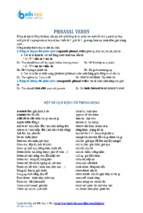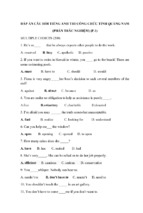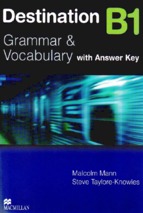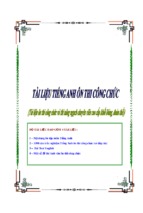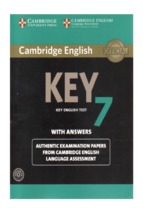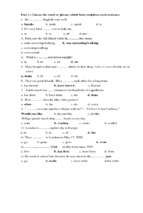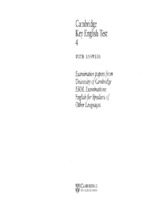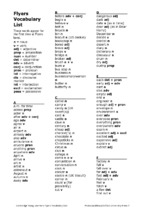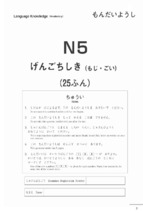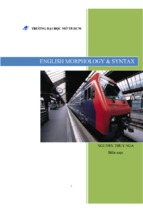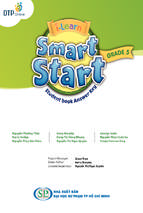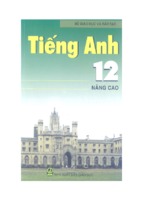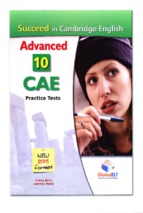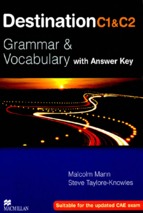Contents
Diagnostic grammar test
6
Grammar
Present tenses
A1
Present continuous
12-13
A2
Present simple
14-15
A3
Imperatives
16-17
A4
Present perfect
18-20
A5
Present perfect continuous
21-23
A6
Present simple passive
24-25
A7
Present perfect passive
26-27
A8
Stative, transitive and intransitive verbs
28-29
A9
Adverbs of frequency
30-31
Past tenses
A10
Past simple
32-33
A11
Past continuous
34-35
A12
Past perfect
36-37
A13
Past perfect continuous
38-39
A14
Would / used to
40-41
A15
Past simple passive
42-43
Future tenses
A16
The future with will
44-45
A17
Going to / be about to / be due to
46-47
A18
Future continuous
48-49
A19
Future perfect
50-51
Model verbs
A20
Obligation and permission
52-53
A21
Possibility and certainty
54-55
A22
Ability
56-57
A23
Advice
58-59
A24
Could / was able to / managed to
60-61
I3
Comparing
A25
Comparatives and superlatives
62-63
A26
Too / too m uch / too m any / enough / as...as
64-65
Conditions
Real conditionals - zero
66-68
Real conditionals - first
69-71
Unreal conditionals (1) - second conditional, I wish and If only
72-73
Unreal conditionals (2) - third conditional and mixed conditionals
74-75
Reporting
A31
Reported speech
76-79
A32
Reporting verbs
80-81
A33
Relative clauses (1) - defining clauses
82-83
A34
Relative clauses (2) - non-defining clauses
84-85
Verb + infinitive / gerund
86-87
Countable / uncountable / abstract / mass
88-89
Articles
90-92
Prepositions of tim e
93-94
Prepositions - location and movement
95-97
Defining
M ulti-word verbs
98-101
.inking words
B1
Addition and concession
102-103
B2
Reason and result
104-105
B3
Purpose
106-107
B4
Showing attitude
108-109
B5
Staging and sequencing
110-111
B6
Exemplification, summarising and concluding
112-113
B7
Cohesion
114-116
B8
Emphasis
117-119
I
V o c a b u la ry
Describing people
120-121
Describing things
12 2-1 2 3
Art and culture
1 2 4-1 2 5
Cities and towns
1 2 6 -1 2 7
Collocations
1 2 8-1 2 9
Education
130-131
Energy
13 2-1 3 3
Environment
1 3 4-1 3 5
Food
1 3 6-1 3 7
Health
1 3 8-1 3 9
Research, discoveries and inventions
140-141
Information Technology (IT)
14 2-1 4 3
Language
1 4 4-1 4 5
Materials
1 4 6-1 4 7
Media
14 8-1 4 9
Money
150-151
Numbers, fractions and percentages
1 5 2 -1 5 3
Relationships and families
1 5 4-1 5 5
Studying and courses
1 5 6-1 5 7
Sports
1 5 8-1 5 9
Tourism, transport and travel
160-161
Feelings and attitudes
1 6 2-1 6 3
Work
1 6 4-1 6 5
A n s w e r key
Diagnostic test
166
A
Grammar
167
B
Linking words
177
C
Vocabulary
179
Audioscripts
184
|5
Diagnostic grammar test
Do the test to help you find which grammar points you need to practise. Each question is related to
grammar units in Achieve IELTS Grammar and Vocabulary.
1 Choose the correct alternatives to complete the passage.
— China
- - - Middle East
—
Japan
Africa
--U S
— EU
..... Latin and Central America
The line graph (1) shows / is showing / has shown the share of world product production. The horizontal
axis (2) gives / is giving / has given the time in years, while the vertical axis (3) represents / is
representing / has represented the percentage of the share. The graph (4) demonstrates / is
demonstrating / has demonstrated some significant trends in the pattern of world production. Overall,
China's share of production nowadays (5) rises / is rising / has risen rapidly, while that of the European
Union (6) falls / is falling / has fallen. As a result of this swift growth, China's share of world product
(7) rises / is rising / has risen from 3.4% in 1980 to 15.4%. Looking at the chart in more detail, we can
see that the share of world production for Japan and Latin and Central America (8) drops / is dropping /
has dropped since 1980. The US share (9) remains / is remaining / has remained the same over the
same period, at around 20% of the total, and the Middle East’s and Africa’s share (10) stays / is staying
/ has stayed steady for the past two decades at about 4% each.
2 Decide which sentences are incorrect and correct them.
1
2
3
Agnes has had terrible headaches for a while now and she’s finally gone to see a doctor about it.
Recently I ’ve listened to Highway 61 Revisited a lot. What have you listened to lately?
Farmers have got their produce ready all year round for Thanksgiving celebrations when Americans
4
all over the world sit down for a family meal.
Have you been paying attention to your lectures? I hope so, because next week’s test is all about them.
For the past three years, conservation groups are pushing for a ban on overfishing in the North Sea.
5
6 | Achieve IELTS Diagnostic grammar test
3
Complete the passage using the correct form of the verbs in brackets.
S o ftw a re te s tin g
Long before a computer program (1)........................(ship) to the
customer, software testing (2 )....................... (perform)
by independent testers. Testing can be done on the following levels:
Unit testing (3 )....................... (test) individual pieces
of the software. Each basic component of the software
(4 )....................... (test) to verify that the design (5 ).....................
(implement) correctly. In the second kind of test, integration testing,
progressively larger groups of tested software units
(6 ) .................... (integrate) and tested until the software
(7 ) .................... (work) as a system. Then system testing
(8 ) .................... (check) the whole system to see that it works.
Before shipping the final version, alpha and beta testing
(9 ) ....................(often do). Alpha testing is testing by potential users / customers. Beta testing comes
after alpha testing. Versions of the software, known as beta versions, (1 0 )....................... (release) to a
limited audience to make sure the product has few faults or bugs.
4
Complete the sentences using the correct fo rm o f the verbs in brackets.
1
I ’m so angry w ith Alice. W hile I ....................... , sh e ........................ a party in her room next door.
(study / have)
2
P io tr....................... the room when h e .........................that he didn’t have his key. (leave / remembered)
3
In 1969, a Soviet satellite....................... the Moon as the American astronauts..........................
(orbit / land)
4
M a g a li....................... even.........................the wall; when she.........................her car, she
....................... the road at all. (not see / crash / not watch)
5
I ....................... later that my Internet connection wasn’t working, but until then I .........................for
her email, (realise / wait)
5
Complete the passage using the correct form o f the verbs in brackets.
It is said that Galileo (1 )....................... (drop) objects of the same material, but of different weights,
from the Tower of Pisa to prove that the time they took to fall did not depend on their weight. This was
contrary to what Aristotle (2 )....................... (teach): that heavy objects fall faster than lighter ones.
Galileo also (3 )....................... (think) that objects keep their speed unless a force — often friction —
slowed them down. But Galileo’s discoveries (4 )....................... (not be) entirely original. Nicole Oresme
in the 14th century (5 )....................... already.........................(think) about the mathematical law for
acceleration; Ibn al-Haytham (6 )....................... (propose) ideas along the same lines centuries earlier and
Mo Tzu (7 )....................... (discover) it centuries before either of them. However, Galileo was the first
person who (8 )....................... (express) these ideas mathematically and checked them with experiments.
Achieve IELTS Diagnostic grammar test | 7
6
Choose the correct alternative.
Joy:
Hasan:
Joy:
Hasan:
Joy:
Hasan:
Joy:
Hasan:
Joy:
7
What are you doing, Hasan? Are you writing a training programme?
That’s right - I need to get fit, I (1) ’m doing / will do / ’m going to do the University
half-marathon.
You ’re j oking.
No, I’m quite serious, I planned it last month and I (2) ’m seeing / will see / ’m going to see it
through. It’s for charity.
So when (3) is it taking / will it take / is it going to take place?
It’s in three months’ time, but entry forms (4) are being / will be / are due to be given in
tomorrow and I (5) will not / ’m not missing / ’m not about to miss the deadline.
You really are serious. Do you know, I think I (6) ’m going to join / ’11join / ’m joining you I’ll help you train.
Look, you can if you want, but only if you (7) ’re taking / ’re going to take / due to take it
seriously and not play around.
I won’t play around! I (8) ’m trying / ’m going to try / ’11 try my best. Promise.
Complete the passage using the correct form of the verbs in the box.
visit
increase
rise
prescribe
work
practise
The rise of the Physician Assistant
The Physician Assistant - health professionals w ho practise m edicine as members of a te a m with
a d o c to r supervisor - is the third fastest-growing profession in the United States. Approxim ately
206 million patients (1 )....................... a Physician Assistant by the end of the year and Physician
Assistants (2 ) ....................... or re co m m e n d e d approxim ately 250 million m edications during this
time. Approxim ately 55,000 people ( 3 ) ....................... as Physician Assistants a t the beginning of
next year a nd the largest num ber ( 4 ) ....................... in New York and California. By the end of
the year the num ber of Physician Assistant jobs in the US ( 5 ) ..........................by 49%, while total US
em ploym ent (6 ) ....................... by only 15% in the same period.
8
Rewrite the sentences using should(n’t), could(n’t) or have to.
1
It’s a good idea to wear a warm coat.
Ycu should wear a warm coat.
2 It is necessary to fill in an application form.
...............................................
3 It’s a bad idea to sleep so much.
4 Ann knew how to speak four languages.
................................................
5 If I were Marc, I’d apply for a part-time job.
................................................
6 It was impossible for Sarah to get home early.
................................................
7 Paul wasn’t able to believe it when he saw the results of his test....................................................
8 To get a driving licence, you are required to take a written test......................................................
8 | Achieve IELTS Diagnostic grammar test
9
Complete the dialogue using can(’t), may or might.
Cheng:
Administrator:
Cheng:
Administrator:
Cheng:
Administrator:
Cheng:
Administrator:
Cheng:
Excuse me, can you tell me where I ( 1 ) ........................get an application form for
language classes?
Yes, just wait a minute while I find them.
(2) ........................ I sit down and wait?
Yes, of course - it (3 )........................take me a few minutes - I ( 4 ) ........................
remember where I put them now. OK, here we are. We have several options for you which languages are you interested in?
Well, I ( 5 ) ........................already speak English and Mandarin, of course, so I’m
interested in learning French.
Let me see ... yes, you (6) ........................attend French classes on Wednesday and Friday
afternoons.
Wednesday afternoon ( 7 ) ........................ be difficult as we (8) ......................... have an
additional lecture then, and I’m sure I ( 9 ) ........................go on Friday afternoon - we
have a tutorial.
I wonder, there (1 0 )........................be another possibility here. Yes, here we are - starting
next week there will be a class at lunchtime on Monday. Could you make that?
That’s perfect - thanks.
10 Correct the mistakes in the passage.
The bar chart sh owe the cost of living for
eight cities in comparieon with New York. In
particular, we have the three expensivest
cities and three middle-ranked cities and the
two cheap cities. The costliest places to live
are all in Europe, with Oslo the most priciest
city on earth. Paris and London are almost as
expensive to live in is each other, with London
a little more cheap than Paris. Furtherer down
the table are Moscow and Hong Kong, with
the same cost of living as each other, but
both of these are a lot least expensive than
Oslo. Suprisingly, New York is not as costlier
to live in as Moscow or Hong Kong. The most
least expensive places to live are Mumbai and
Caracas. It costs lesser than half as much to
live in Caracas as it does to live in Oslo, Paris
or London.
Cost of living
Oslo
Paris
London
Hong Kong
Moscow
NewYork
Mumbai
Caracas
150 m
11 Choose the correct alternative.
1
2
3
4
5
A: I’ve got stomachache.
A: His face is red.
A: I’m exhausted.
A: I feel tired.
A: Erika’s feeling sick.
B: You’ve had too much / enough / too many to eat.
B: He’s been in the sun enough / too many / too much.
B: You’ve been working enough / too many / too much.
B: You haven’t had enough / too many / too much vitamins.
B: She’s had enough / too many / too much sweet things.
Achieve IELTS Diagnostic grammar test | 9
1 2 Complete the sentences using the correct form of the verbs in brackets.
1
2
3
4
5
6
7
If Jolanata...... ................ (not leave) now, s h e .............. ..........(miss) her bus.
If H elen .......... ........... (work) hard, s h e ........................ (pass) her exams.
In an electrical storm, if y o u ........................(be) outside and away from a building,.........................
(take) cover in a vehicle if possible.
If v o u ............ ........ (be) not near shelter,.................... .... (avoid) standing under trees or other tall
objects.
If M ary .......... ............ (not practise) her French, she . .......................(not improve).
The tu to r....... ...............(be) angry if y o u .................... ... (arrive) late again.
(see) Joe tomorrow, I ....................... (give) him the message.
If I ...................
1 3 Correct the mistakes in the sentences.
1
If you would meet Peter, you would like him.
2
If I have a lot of money, I’d buy a Ferrari.
3
If he had time, John will go to the gym more often.
4
I wouldn’t touch that if I am you.
5
Would you still gone to Sydney if you had known it was so expensive?
6
Wouldn’t you sorry if you failed the exam?
7
If I hadn’t been so clumsy, I wouldn’t break your DVD player.
8
What you will do if you missed your train?
14 Choose the correct alternative.
1
2
3
4
5
6
The Minister of Health denied / refused that there was a crisis.
Carmen said me / told me to be quiet.
Rory persuaded me / insisted me to stay for dinner.
The tutor advised me / suggested me to work this weekend.
She explained me / warned me not to leave the light on all night.
Tony and Rachel announced / reported that they were going to get married.
10 | Achieve IELTS Diagnostic grammar test
1 5 Rewrite the sentences using the word in brackets.
1 We want to see a film. It starts at seven, (that)
The film th a t we want to see sta rts a t seven.
2
Steve’s car was stolen. He went to the police, (whose)
3
A friend met me at the station. He carried my bags, (who)
4
Rachel cooked the food. It was delicious, (that)
5
A friend is staying with Peter. He comes from Paris, (who)
6
I found a m an’s wallet. He gave me £10. (whose)
1 6 Complete the exam tips using the verbs in the box.
work out
pick up
pick out
look up
look for
look back
come across
brush up
Want to (1)on your reading and writing skills for IELTS? Then read on!
When reading in English, avoid (2 )....................... every new word or phrase in the dictionary or you will
soon feel demotivated. Only check the meaning of something that is really important for understanding
the text. When you have finished reading, (3 )........................at what you have read, (4 )......................... a
few key words and phrases that interest you and check their meanings in a dictionary. In the same way,
when you listen to English, don't panic when you (5 )........................some words or expressions that you
don’t know. Keep listening and you can often (6 )........................some clues and get an idea of the
overall meaning. When you read or listen to English, it is sometimes possible to (7 )....................... the
meaning of an unknown word before you check it in the dictionary. Decide what part of speech the word
is before (8 )................................ clues from the context or form.
Now check your answers. p166
Achieve IELTS Diagnostic grammar test | 11
Grammar
A1
Present continuous
1 Read the passage, and put the diagrams in order.
Japan's changing demography
In Japan, the average population is getting older. People are living longer, and they are not having so many children.
The number of people who work is falling, but the number of retired people is growing. This is having an effect on the
economy, as fewer people are paying taxes, while the number of people they have to support is increasing. Why is this
happening? People are living to a very old age because medical care is improving, and more women are joining the
workforce, so they are waiting longer to have a family and the birth rate is slowing.
1.2 0.8 0.4 0 0.4 0.8 1.2
1.2 0.8 0.4 0 0.4 0.8 1.2
1.2 0.8 0.4 0 0.4 0.8 1.2
100
0}
Men
Women
80
60
40
20
0
Diagram C
Diagram B
Diagram A
Present continuous
Use it for IELTS!
We use the present continuous when we are
• describing a process which is taking place right now or around
now (Activities 3 and 5)
\
• talking about future plans (Activities 4 and 5).
Remember that stative verbs are not normally used in the continuous form
(see Unit A8), and that the infinitive is used after modal verbs.
You can use the present
continuous to describe graphs
(especially line graphs) that
show trends over recent years.
Form
Affirmative
People are living longer.
The number o f retired people is growing.
I
am
You / We / They
are
He / She / It
is
living longer.
Negative
They are not having so many children.
I
am not
You/We/They
are not (aren’t)
He / She / It
is not (isn’t)
living longer.
Question
Yes / No questions
Wh- questions
To be + subject -f present participle
Are they living longer?
Wh- question + to be + subject + present participle
Why is this happening?
12 | Achieve IELTS Grammar
Spelling rules for present participles
• Verbs ending in e - delete e, add ing
live - living
• Most verbs ending with a short vowel /e/, lof, /as/, hi, /a/, h i
+ consonant - double the consonant, add ing
get —getting
• Verbs ending in y, and most other verbs - add ing
hurry’ —hurrying wait —waiting
2
Read the passage in Activity 1 again and count the num ber of present continuous verbs.
3
Complete the passage w ith the correct form of the verb in
brackets, using present continuous where possible.
World temperatures, 1860 - 2000
The Earth’s climate ( 1 ) ..................... (change). The Earth
( 2 ) ..................... (warm) up, and most scientists now ( 3 ) ...................
(agree) that human activity (4 )........................(cause) this to happen.
Species of plants and animals (5) ..........................(die), and chances
for ecosystems to adapt (6) ..................... (diminish). What
(7 ) ..................... governm ents.......................(do) about it? They
(8) ..................... (discuss) ways we can reduce carbon emissions,
but many powerful governments and businesses ( 9 ) .....................
(co-operate) with the advice from the experts.
4
Complete the passage with the verbs in the box. Use present continuous where possible.
increase
hunt
believe
cause
develop
result
poison
disappear
happen
sell
not adapt
Some people (1) ................... that we are in the middle of a mass extinction
of animal life. Why (2)..................... th is.......................? Global warming may
be one reason, but many other factors (3 ) .................... difficulties for wild
animals. In many countries, poachers (4)......................rare animals for
money. They (5 ) .................... the animal parts for traditional medicine. As the
human race ( 6) ..................... , natural habitats (7)...................... and the
animals (8) .................... to the new environment. Chemicals used by farmers
(9) ......................the land, and this (10) ......................in imbalances between
the species. However, extinction of certain species may also be part of a natural
process, as new species (11) .................... to replace those which are lost.
5
® Play Track 1. Listen to P a rt 1 of an IELTS interview and complete the notes.
Petros (1)......................English and ( 2 ) ....................... as a waiter. He ( 3 ) ....................... to study a t
university. After th at, he (4 ).................... his father’s business in Athens. Petros ( 5 ) ..................... his
studies, but he (6 ) ............................................ a problem paying his fees.
Now check your answers. p167
Achieve IELTS Grammar 113
Grammar
A2
Present simple
1 Read the text and the student's response. Complete the labels.
Writing task 1
The chart below shows what working Americans aged 25-65 do during the day. Summarise the
information by selecting and reporting the main features.
The pie chart shows how an. average American spends
their time.
Time use on an average work day
The chart is divided into six sections showing activities
per hour over one day. Americans are hard-working they work 8.2 hours a day. They sleep jor 7.6 hours,
take part in sports and leisure jor another 2.5 hours and
do other activities jor 2.5 hours. Americans do not take a
long time jor meals; they eat and drink jor 1.5 hours
each day.
011
□ 3
■
4
□
5
■6
What do they do jor the rest oj the day? Care jor others.
Present simple
\
We use the present simple to talk about
• something which happens on a regular basis; repeated actions
(Activity 3) and feelings
• facts (Activity 4)
• timetables (Activity 5).
Use it for IELTS!
You can use the present simple
to write about graphs and
tables that show information
that is generally true and to
write about the main features in
a graph or table,
v____________________________ J
Form
Affirmative
To be
Spelling
I
am
You / We / They
are
He / She / It
is
hard-working.
verbs without e + s
drinks, shows
verbs ending with s, sh, ch + es
finishes, teaches
verbs ending consonant + y -► ies
study - studies, carry - carries
Other verbs
I / You / We / They
work
He / She / It
works
8.2 hours a day.
Negative
I / You / We / They
do not (don’t)
He / She / It
does not (doesn’t)
take
a long time for meals.
Question
Yfes / No questions
Wh- questions
Do Americans have a long time fo r meals?
What do they do fo r the rest o f the day?
14 | Achieve IELTS Grammar
2 Read the passage in Activity 1 again and underline the present tense verbs.
3 Look at the chart and complete the passage.
(not) write
gives
(not) read
watch
shows
The bar chart shows how children (1 ).....................
120r
their time during the day. The vertical axis
100
listen
spend
use
Average time spent
i each activity
one day
(2) ....................time in minutes while the horizontal
axis (3 )..................... eight different activities.
Children in the UK spend most time playing, at
nearly two hours for each activity. They
(4 ) ...................TV for over an hour and a half but
(5 ) ...................much at just over half an hour.
Children (6 )..................... to music for over half an
hour but (7 )..................... as much as this at just
0
twenty-one minutes. Finally, they (8 )..................... a
111 h i
Watching
TV or
video
Reading Playing
outside
Playing Listening Writing Using
Playing
with
to
a
video
toys
music
computer games
computer the least time.
4 Choose the correct tense to complete the sentences.
The Amazon rainforest
The Amazon rainforest (1) covers / is covering 7,000,000 km2 and
(2) is crossing / crosses nine nations. Brazil (3) contains / is
containing 60% of the rainforest and Peru (4) has / is having 13%.
Rainforests (5) are supporting / support over half of our planet's
plants and trees. Although the Amazon (6) is representing / represents
over half of the planet’s remaining rainforests, people (7) are cutting /
cut down 16,235 km2 of it every year and (8) are growing / grow soy
crops on the land.
5
(§) Play Track 2. Listen and complete the timetable.
Foundation in Civil and S tructu ral (1 ).........................
Monday - Thursday ( 2 ) ...................... - 12 am ( 3 ) ..........................
Monday / Tuesday pm ( 4 ) ...................... with tuto r.
Wednesday / Thursday lab work, Dr Boot ( 5 ) ...................... , Lab Technician also (6)
Now check your answers. p167
Achieve IELTS Grammar | 15
Grammar
A3
Imperatives
1 Read the passage and choose the correct answers.
Keeping safe
If you often walk home in the dark, get a personal attack alarm.
Carry it in your hand so you can use it immediately to scare off an
attacker. (A)
Always carry your bag close to you with the opening facing towards you.
Keep your house keys in your pocket. But if a stranger grabs your bag,
let it go immediately. Never put up a fight - you could get hurt. (B)
Keep to well-lit roads with pavements. Avoid dark alleys and subways
and don’t take short-cuts through parks or across waste ground.
Do remember that if you wear an iPod, you won’t hear traffic or
someone approaching behind you. (C)
If you regularly go jogging or cycling, try to vary your route and time. On parklands, keep to the
main paths and open spaces, where you can see and be seen by other people. (D)
1 Carry your house keys in your
A bag.
B pocket.
C hand.
2 If someone tries to take your bag,
A scream for help.
B do your best to hang on to it.
C give it up immediately.
3
If you go cycling or jogging,
A avoid open spaces.
B go at the same time each day.
C use different routes.
Imperatives
We use imperatives to
• tell people what to do
• advise them
• encourage them
warn them
give directions.
Form
Imperatives look the same as infinitives without to.
Affirmative
Keep your house keys in your pocket.
We can use do to make emphatic imperatives.
Negative
Don V take short-cuts through parks or across waste
ground.
Do remember that i f you wear an iPod, you w on’t
hear traffic or someone approaching behind you.
Note the position of always and never before imperatives:
Always ca n y your bag close to you.
Never put up a fight.
16 | Achieve IELTS Grammar
2 Put these sentences into the correct part of the passage in Activity 1: (A), (B), (C) or (D).
1
2
3
4
Always walk facing the traffic so a car cannot pull up behind you unnoticed.
Stay clear of wooded areas for this reason.
Make sure it is designed to continue sounding if it is dropped or falls to the ground.
Remember, your safety is more important than your property.
□
Match the beginning of each sentence on the left with its ending on the right.
1 Never make it easy for a pickpocket so...
2 Keep your bag close to you when in public
places and...
3 Tell your bank as soon as your card has been
stolen, as...
4 Keep your personal identification number
(PIN) separate from your bank card and...
5 Always sign your new bank card as soon as
you receive it and...
6 Cash is a favourite target for thieves so...
A someone could use it to make purchases in
your name.
B cut up the old one.
C avoid carrying large amounts with you.
D keep the clasp or zip shut.
E carry your wallet in your inside pocket rather
than your back pocket.
F never disclose it, not even to bank staff or
close friends.
4 Choose the correct alternative.
A thief needs only a minute to steal your possessions so (1) try to / make an effort be careful at all
times. (2) Never / Always be on your guard and (3) never / always look away for a second. Wallets
carried in back pockets are vulnerable to pickpockets. (4) Put / Don’t put them in a front trouser or
inside jacket pocket, preferably one which fastens. In public places, (5) make sure / keep your bag is
close to you where you can see it and (6) close / open the clasp or zip. If your bank card is stolen,
(7) notify / avoid notifying your bank immediately. (8) Have / Don’t have the number handy.
(9) Make sure / Remember that a delay reporting the loss could lead to a crime being committed in your
name. (10) Don’t forget / Do make sure that thieves can use cards to make over-the-counter, telephone
and online purchases.
5 Complete the passage using the correct form of the verbs in the box.
ask for
book
give
sit
keep
get in
check
ask
Staying safe - taxis
If you are going to be out late, try to arrange a lift hom e w ith friends or (1)
(2)
...
a taxi. Always
the phone num ber of a reliable taxi firm handy.
At the tim e of booking (3)
a description of the car (colour, make, etc.) and ( 4 ) .....................................
your name.
When the taxi arrives (5)
that it is the one you ordered. (If in any doubt, ( 6 ) ........................
the vehicle.)
During the journey always (7)
When you get hom e (8 ).
behind the driver.
the driver to w ait until you are safely inside.
Now check your answers. p167
Achieve IELTS Grammar | 17
Grammar
A4
Present perfect
1 Read the task and the student’s response, and complete the chart.
Writing task 1
The chart below shows how numbers of immigrants to Australia have changed over the past ten
years. Write a summary of the information given.
The bar chart shows how numbers oj
people moving to Australia jrom nine
dijferent regions have changed in the past
ten years. Overall, there has been a
decrease in immigration. Numbers jrom
Europe, southeast and northeast Asia have
fallen sharply. Additionally, immigration
jrom India, the Middle East and North
America has gone down slightly. Have any
regions shown an increase? Numbers jrom
Oceania and Ajrica have not jallen; in
jact, numbers jrom Ajrica have more than
doubled over the past ten years.
Immigrants to Australia
30.000
25.000
20.000
15.000
10.000
5,000
0
India,
Sri
Lanka,
Pakistan
Europe 1
& former
USSR
Middle South &
East & Central
North America
1992 number ■ 2002 number
Present perfect
Use it for IELTS!
The present perfect is always related to present time.
We use the present perfect to talk about
• past events which are still news (Activities 1 and 3)
• actions which are now complete, often with yet and already
(Activities 4, 5 and 6)
• past events with a present result (Activities 7 and 8)
• experiences and news events (Activity 9).
Affirmative
You can use the present perfect to
write about charts and graphs that
show changes which have
happened up to now. You can also
use it to give examples of recent
news stories to support your
arguments in Writing task 2, and to
talk about your experiences in the
Speaking test.
Negative
I/You/W e/They
have
I / You / We / They
have not (haven't)
He / She / It
has
He / She / It
has not (hasn’t)
Overall, there has been a decrease in immigration.
fallen.
Numbers from Oceania and Africa have not fallen.
Question
Yfes / No questions
Wh- questions
Have any regions shown an increase?
Where have the immigrants come from ?
Read the passage in Activity 1 again and underline the examples of the present perfect.
18 | Achieve IELTS Grammar
3 Complete the sentences using words from the box. Use present perfect where possible.
more
rise
move
leave
fall
since
fewer
not change
Numbers of immigrants from B ritain....
Immigrants to New Zealand
............. considerably........................2003.
10,000
The number of people moving to New
CO
1 8,000
Zealand from C h in a..................... by
05
..................... than 1,500.
f 6,000
Not so many people from In d ia ..............
| 4,000
SD
to New Zealand in 2004, compared to
2,000
2003.
The number of immigrants from South
0
2001
2002
2003
2004
A frica......................very much.
5 ..................... people from Fiji ..................... home to live in New Zealand in 2004.
|
□ Britain
□ China
□ India
□ South Africa
■ Fiji
(§) Play Track 3. Listen to the conversation between two IELTS candidates and tick the activities
they have done.
Candidate A (female)
Candidate 5 (male)
Send application form
□
□
Receive confirmation
□
□
Find passport
□
□
Watch speaking te s t video
□
n
Do practice te s t
□
□
Buy alarm clock
□
□
(§) Play Track 3. Listen again, and complete the rule for yet and already.
1 Yet is used w ith .................... a n d ......................sentences.
2 Already is used w ith ..................... sentences.
Complete the conversation between Sally and Bohos, who are preparing to go on holiday. The list
shows what thev have / have not done.
Book hotel - Sally
/
Check weather forecast - Bohos
/
Buy flight tickets - Sally
/
Do washing - Sally
X
Appy for visa - Bohos
/
Call parents - Bohos
X
Pack suitcase - Sally
X
Bohos: ( 1 ) ......................y o u .......................the hotel ( 2 ) ......................., Sally?
Sally: Yes, I did it this morning. I ( 3 ) ......................the flight tickcts too, from the airline website.
Bohos: Good. Now, let’s look at the list to see what else we have to do. OK - I ( 4 ) ..................... for my
visa, but it ( 5 ) ..................... yet. Packing the suitcase is next - that’s your job, Sally.
Sally: Well, I (6) .................... it ( 7 ) ......................, because I still (8) ...................... the washing, and I
don’t want to pack dirty clothes. You need to check the weather forecast and call your parents.
Achieve IELTS Grammar | 19
Bohos: I ( 9 ) .................... the weather forecast, and it’s going to be fine and sunny tomorrow. So there’s
one more thing I have to do. I ( 10) ..................... my parents ( 11)
7 Complete the passage using the correct form of the words in brackets.
(1 )........................................... (you / try) making your own bread? If you haven't, you should. It’s not
difficult. After you (2 )........................................... (measure) the correct amount of flour and warm water,
mix them together in a bowl. You now need to add yeast, salt and sugar. When you (3 ).............................
............. (do) this, work the mixture with your hands, then leave it in a warm place for an hour. When it
(4)
(grow) to double the size, work it with your hands again. It should feel dry
to the touch if you (5 )........................................... (follow) the instructions correctly. Put the bread mixture
into a tin, and leave it for
an hour until it (6 )............................... (rise) up
over the top. Finally,
when you (7 )..........................................(heat) theoven,bake the breadfor about forty minutes.
8 Choose the correct tense to complete the sentences.
1 I took / have taken the IELTS test three times now, and the last time it was / has been much easier for me.
2 When you finished / have finished with the newspaper, can I have it?
3 Yesterday I didn’t eat / haven’t eaten breakfast, but so far this morning I had / have had three pieces of
toast and a banana.
4 This grammar book is no use to me - someone filled in / has filled in all the answers!
5 Good morning, class. Did you do / Have you done your homework? Please give it to me.
6 It rained / has rained nearly every day last month, but this month the weather was / has been very
good.
7 There isn’t any milk left - the others must drunk / must have drunk it all.
8 A: Can I speak to Gordon, please?
B: I’m sorry, he’s not
here. He went / hasgone tosee afilm.
9 I wrote / I’ve written 2,000 words of my dissertation, but I still have 1,500 to write.
10 The value of the pound sterling dropped / has dropped considerably since last year.
9 Write the newspaper headlines in full.
1 Foreign minister returns from Washington
The foreign minister has returned from Washington.
2
Police catch £30 million bank robber
3
Damaged aircraft lands safely - 200 people survive unhurt
4
Prime Minister caught in love triangle! Offers to resign immediately
Now check your answers. p167
20 | Achieve IELTS Grammar
Grammar
Present perfect continuous
A5
Read the conversation and choose the correct answer.
Examiner:
Candidate:
Examiner:
Candidate:
1
How long have you been living in Brisbane, Zhang?
I’ve only been living here for about two months - but I really like it. I ’ve been staying with a
host family and they’re very good to me.
What kinds of things have you been doing?
Well, the coast is great here, so I’ve been surfing quite a lot. Unfortunately I keep falling off
because I haven’t been practising very much.
Zhang has been in Brisbane for
A one month. B two months. C three months.
He has been staying
A at a hotel. B at a college. C with a family.
He isn’t very good at surfing because he
A hasn’t got a good surfboard. B falls off a lot. C hasn’t been practising.
2
3
Present perfect continuous
Use it for IELTS!
Use the present
perfect continuous
in the Speaking test
to talk about your
experiences of
working or studying
which are continuing
up to now.
V__________________
We use the present perfect continuous to talk about events when
•
we refer to longer actions, events or trends (e.g., working, learning, studying) (Activity 1)
•
the action or activity leads to a result or is important in the present (Activity 4 and Activity 6)
•
we are focusing on the action or activity (Activity 3 and Activity 5)
• the action or activity continues to the present time. (Contrast this with the present perfect, Activity 4.)
We can use the present perfect continuous with wrords and phrases like fo r , since, recently, lately, or time
phrases like all morning i day ! week.
Form
Affirmative
I / You / We / They
have
He / She / It
has
been living
here for two months.
I’ve only been living here fo r about two months.
I ’ve been staying with a host family.
Negative
I / You / We / They
have not (haven’t)
He / She / It
has not (hasn’t)
been working
very hard.
I haven’t been practising very much.
Question
Yes / No questions
Wh- questions
Have you been taking surfing lessons?
What kinds o f things have you been doing?
Achieve IELTS Grammar | 21
- Xem thêm -

